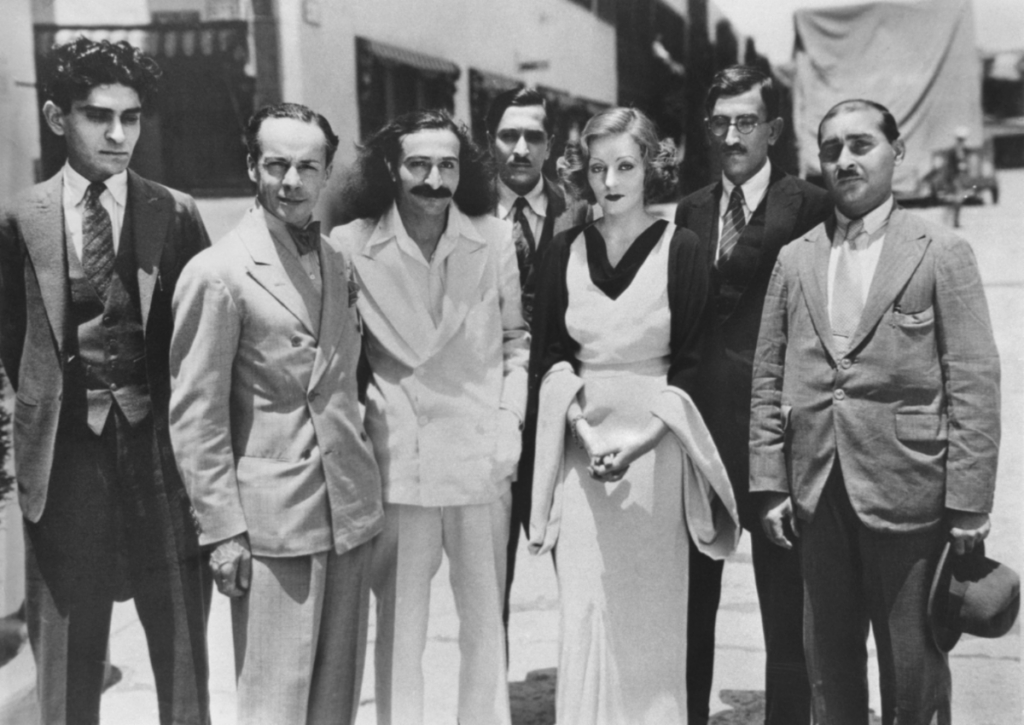
March 28, 2025
Cinema Stories
In June,1934, while in London, Meher Baba said, “When I work collectively, which is generally at plays, movies and sporting events — wherever people collect and concentrate on a particular object — it is easy for me to have my spiritual effect collectively on their minds.” [1]
Going to the movies with Meher Baba was similar to taking a roller coaster ride, uncertain of when the experience would come to an end. Here are a few of the accounts from those who sat in a darkened theater near their Beloved Baba.
Mani, Baba’s sister, explained, “If the picture were good, the attention of the audience would be focused on the screen, facilitating Baba’s work. But when the picture was not interesting, people’s attention wandered, making Baba’s work more difficult. Mani speculated that this is why often, during an especially gripping film, Baba left early, his work being finished. Whereas, during a poor picture, he had to sit through it until the end to complete the work he had come to do. When Baba did get up to leave, the women nudged each other in the pitch-dark and whispered, “Baba’s going!” Dropping their interest in the movie, all hurried out behind him.” [2]
During His overseas tours Baba went to movie theaters in Los Angeles, New York, London, Paris, Madrid and Shanghai. Kitty Davy recalled, “Why did we go to so many cinemas? ” Baba said,’“I can work well when everybody’s mind is concentrated in one direction; then I am free to work with each one of you as I choose.”’ [3]
In 1934, Baba attended a cinema in Marseille with several of His Western devotees. The movie was French, to some it appeared suggestive and rather dull; some had fallen asleep. Rano Gayley sat beside Baba, serving as a translator. At one point, Delia De Leon piped up, “Baba Darling, is your spiritual work not finished yet?” [4]
Filis Frederick recalled her experience attending the comedy Where’s Charley? at Radio City Music Hall, “While the conscious attention of the audience was focused on a film, Baba would work intensely on the deeper levels of mind. In fact, on the occasion mentioned, I was too excited by being in the same theater with Baba; He sent over a message, ‘Filis, pay attention to the film.’” [5]
Prior to leaving behind his worldly attachments and joining Baba full time, Framroze Dadachanji (Chanji) owned the Madeline Cinema in Bombay. He recalled that Baba would always leave at a movie’s most captivating and dramatic scene. Although the mandali would inevitably follow Baba out of the theater, their gazes would remain focused on the screen as they attempted to watch as much of the film as possible.
Over the years, Baba and the mandali saw movies throughout India, and mainly in Ahmednagar. A handful of movies He saw were Citizen Kane in Dehradun, Laila Manju (1931) at the Circle Cinema in Nasik, and Jhanak Jhanak Payal Baaje (trans. The Ankle Bells go jhanak jhanak) at Asha Talkies in Ahmednagar. While in between trains in Delhi, Baba saw Charlie Chaplin’s, The Great Dictator at the Regal Cinema. He enjoyed the movie so much that He said could see it seven times and sent word to Meherabad that all should see it.
In 1948, Baba organized what was to become known as “Dawn Matinees” for the women mandali; they were often accompanied by Baba. The women rose during the wee hours of the morning and rushed to attend 6 a.m. movies at the Sarosh Cinema (owned by mandali member Sarosh Irani) where they had the whole theater to themselves. Elizabeth Patterson, by nature was not an early riser, rallied to drive Baba and the women. Once in the theater, Mansari liked to sit directly behind Baba, as she did on the Blue Bus Tours and focus on Him – unless the movie was a comedy.
One scorching afternoon, while in residence at Guruprasad, Baba once took the mandali to see the documentary, African Lion. Meherwan Jessawala described the theater as “a ramshackle place with a tin roof, no ventilation, and no fans running once the picture started, to save on electricity.” This was one time, despite the movie being well done, that all wished that Baba would get up and leave but He chose to watch the entire movie in the stifling heat. [6]
On one occasion, Sam Kerawala, following Meher Baba’s suggestion, treated a group of twenty-six to a Laurel and Hardy movie. Seated in the back two rows of the theater, they all found themselves enjoying the film. Sam relayed this story, ‘“With Beloved Baba, His work was paramount, and sure enough before the film had finished He gestured to Eruch, ‘Let’s go!’ Eruch gave a very half-hearted response, ‘Baba … another five minutes, and I think it will be over …. ‘ Baba gave a gesture of assent, and, incredibly as it may seem, with that gesture, the power went off! After sitting in the dark for a few minutes Baba again nudged Eruch, ‘Do you still want to wait or shall we go?’ Eruch knew he was defeated ‘Yes Baba, let us go!’’’ [7]
[1] Lord Meher, by Bhau Kalchuri, p. 1616
[2] Mehera Meher, A Divine Romance Vol II by David Fenster, p. 333
[3] One Fine Thread, by Kitty Davy. p. 109
[4] Lord Meher, by Bhau Kalchuri, p. 1633
[5] “Notes on the Illusionary Film Project” by Filis Frederick, Awakener Magazine Online, Vol 18 No. 1 p. 37
[6] My Life with Meher Baba, the Avatar of the Age, by Meherwan Jessawla, p. 108
[7] Divine Humanity of Meher Baba Vol I, by Bill LePage, p.104
For a comprehensive list of of the movies that Meher Baba and Mehera saw refer to the Appendix in Mehera Meher, A Divine Romance Vol II by David Fenster, p. 569